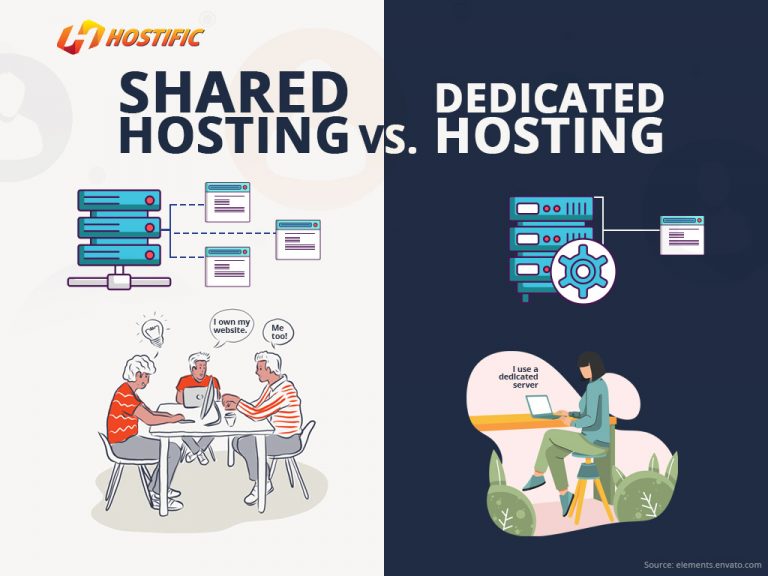If you’re thinking of starting a website, you need to know what your hosting options are. In this post, we look at two of the most popular options, Shared Hosting and Dedicated Server Hosting and the differences between them. Let’s start by defining each hosting option.
Table of Contents
What Is Shared Hosting?
Shared hosting can easily be referred to as the most commonly used form of web hosting. It is when multiple websites share the resources of a single server. For more on shared web hosting check out this article.
What Is Dedicated Hosting?
Dedicated server hosting is the opposite of shared hosting, as websites do not share a server. Dedicated hosting gives each website its own server. Choosing which option is best for you depends on the needs and purpose of your website.
- Do you need the control and flexibility to customize your server or to choose the software and adjust the system to meet your needs?
- Is your website streaming large amounts of video content and high resolution photos or maybe you want a unique IP address.
- How about sensitive information? If you’re going to deal with this kind of data, you will need maximum security.
- Are you looking for an option that is inexpensive, easy to set up and maintain that provides an adequate amount of security?
It’s also important that you understand that while each option comes with advantages and disadvantages, there are differences between shared and dedicated hosting that can aid in your decision to use one as opposed to another.
So, what are the major differences between the two?
7 ways Shared Hosting and Dedicated Server Hosting differ.
1. Number of Sites Hosted on the Server
If you decide to use a dedicated hosting plan it means that your website gets a server devoted solely to it.
The same is not true for shared hosting. Shared hosting, as the name suggests means that you share the resources of a single serve with multiple, sometimes thousands, of other websites.
2. Allocated Bandwidth & Disk Space
With a dedicated server you are treated like an only child. You do not have to worry about using too much bandwidth or disk space out of fear that another website or organization will be shortchanged. This is because you are not required to share the resources.
As a result, there are no limitations on the amount of disk space or bandwidth that your organization can use, because it is all yours. Shared hosting on the other hand is similar to renting a house with several roommates.
The resources in the house are shared to ensure each roommate gets a fair share.
In this case, those resources include the bandwidth and disk space, which become more limited, based on the number of websites or organizations using the server and there are consequences, if you do not abide by the rules set out regarding your allotted bandwidth and disk space.
If you need more than your assigned bandwidth, you will need to upgrade.
Remember that house that we mentioned before? If one roommate uses more electricity or hydro, on any given month, he or she will be expected to pay more. It’s the same thing with shared hosting.
The limitations placed on bandwidth and disk space can also limit what you can do on your website. For example, some web hosts will penalize you for having videos or music on your site, even if you have not maxed out your allotted bandwidth.
3. Security
With a dedicated server you or your IT team are better able to secure your website against security breaches, because you have control over the security programs that are installed. Think again about the owned versus the rented house shared with roommates. If you own the house, you decide what kind of locks go on the door and when that door is closed.
With the shared house, a roommate can easily forget to close the door, which means you are more susceptible to strangers entering your home. In this case those strangers are viruses, malware, spyware, etc.
But a dedicated server reduces your vulnerability to those strangers because you are the only organization using the server.
In the case of shared hosting, it’s the web hosts that are responsible for your website’s security. They do this by installing firewalls and server security applications and programs.
However, because you are sharing a server, the bad behavior of one website on that server can seriously affect the security of your website, which means you are more vulnerable to cyber-attacks, even if you did nothing wrong.
4. Website & IP Blacklisting
Unless you engage in illegal or unethical practices on the internet, you don’t have to worry about being blacklisted, but that’s if you are using a dedicated server.
Shared hosting however opens up your website to the risk of being blacklisted even if you did nothing wrong.
If your roommate, for example, disregards the noise abatement Act, all the residents in that house get penalized when the cops show up. Shared hosting it’s pretty much like that.
If one website on the server decides to participate in illegal or discouraged practices, your website will get punished because you share the same server and IP address.
5. Technical Skill Required
Dedicated hosting requires that you have the technical know-how to set up and maintain your website. If you do not have the required technical skills, you have three options:
- Upgrade to a fully managed dedicated hosting plan which, of course costs more than a regular plan.
- Outsource the different technical skills needed.
- Create an IT department within your organization that will set up and maintain your online presence.
With shared hosting, no technical skills are required. Your web host makes it super simple to set up your site. It then takes the worry out of maintenance, administration and security features, by doing it for you. This however puts some limitations on what your organization can do.
6. Server Performance & Response Time
Have you ever had to share Wi-Fi with a group of people? Compare that to being the only one using the Wi-Fi. That’s kind of what the server performance and response time between dedicated and shared hosting looks and feels like.
With a dedicated server, you are the only one using the resources so you can count on it to respond quickly and efficiently with the bandwidth needed at any given time.
Not so with a shared hosting. An unexpected increase in traffic to one site on the server could drain the resources, leading to slow response and loading times on the other sites sharing the server.
So, if your neighbor’s business starts booming, yours could suffer. You could have slower response and loading times on your site, which is really not your fault.
7. Level of Control:
To choose a dedicated server, is to choose have ultimate control over your website and its operations. You get to choose your programs, applications and scripts to suit your needs. A dedicated server also means that you can have your own SSL to secure your site.
Remember the point on being able to lock the house door and deciding the type of lock to use? A dedicated server allows that.
Shared hosting on the other hand means less control. The web host makes the decisions on your behalf. For tips on creating a website have a look at this blog article.






